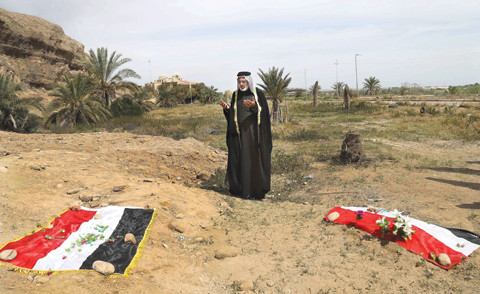PORTO ALEGRE, Brazil: The death toll from floods and mudslides triggered by torrential storms in southern Brazil has climbed to 56 people, with another 67 missing, the country’s civil defense agency said Saturday. Rising water levels in the state of Rio Grande do Sul were straining dams and threatening the metropolis of Porto Alegre, where authorities were scrambling to evacuate some neighborhoods that had been submerged.
Rescuers faced a colossal task, with entire towns made inaccessible by floodwaters. Residential areas found themselves underwater as far as the eye can see, with roads destroyed and bridges swept away by the powerful currents. At least 265 municipalities have suffered storm damage in Rio Grande do Sul since Monday, according to local officials, injuring dozens people and displacing more than 24,000 -- a third of whom have been brought to shelters. President Luiz Inacio Lula da Silva visited the region Thursday, vowing “there will be no lack of human or material resources” in responding to the disaster, which he blamed on climate change. Climatologist Francisco Eliseu Aquino told AFP on Friday that the devastating storms were the result of a “disastrous cocktail” of global warming and the El Nino weather phenomenon.
South America’s largest country has recently experienced a string of extreme weather events, including a cyclone in September that claimed at least 31 lives. Aquino said the region’s particular geography meant it was often confronted by the effects of tropical and polar air masses colliding—but these events have “intensified due to climate change.”
As the rain kept beating down, rescuers in boats and planes searched for scores of people reported missing among the ruins of collapsed homes, bridges and roads. Rising water levels in the state of Rio Grande do Sul were straining dams and threatening the metropolis of Porto Alegre with “unprecedented” flooding, authorities warned.
“Forget everything you’ve seen, it’s going to be much worse in the metropolitan region,” Governor Eduardo Leite said Friday as the streets of the state capital, with a population of some 1.5 million, started flooding after days of heavy downpours in the region. The state’s civil defense department said at least 265 municipalities had suffered storm damage in Rio Grande do Sul since Monday, injuring 74 people and displacing more than 24,000 -- a third of whom have been brought to shelters.
At least 68 people were missing, and more than 350,000 have experienced some form of property damage, according to the latest data. And there was no end in sight, with officials reporting an “emergency situation, presenting a risk of collapse” at four dams in the state.
The level of the state’s main Guiaba river, meanwhile, was estimated to have risen 4.2-4.6 meters (about 13.7-15 feet), but could not be measured as the gauges have washed away, the mayor of Porto Alegre said. As it kept rising, officials raced to reinforced flood protection. Porto Alegre’s worst recorded flood was in 1941, when the river reached a level of 4.71 meters.
Elsewhere in the state, several cities and towns have been completely cut off from the world in what Governor Leite described as “the worst disaster in the history” of Rio Grande do Sul. Many communities have been left without access to drinking water, telephone or internet services.
Tens of thousands have no electricity. President Luiz Inacio Lula da Silva visited the region Thursday, vowing “there will be no lack of human or material resources” in responding to the disaster, which he blamed on climate change. The central government has sent aircraft, boats and more than 600 soldiers to help clear roads, distribute food, water and mattresses, and set up shelters. School classes have been suspended state-wide. - AFP
 Hong Kong Bannar.jpg)









